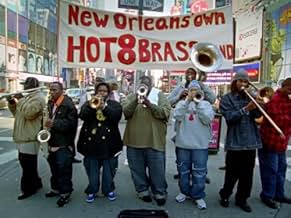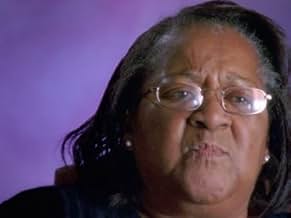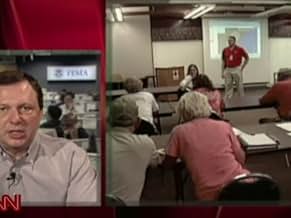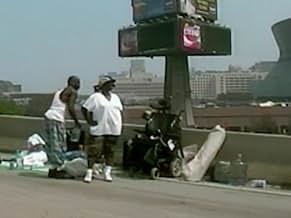Quand les digues se sont brisées: un requiem en quatre actes
Original title: When the Levees Broke: A Requiem in Four Acts
IMDb RATING
8.5/10
5K
YOUR RATING
An examination of the U.S. government's response to Hurricane Katrina.An examination of the U.S. government's response to Hurricane Katrina.An examination of the U.S. government's response to Hurricane Katrina.
- Won 3 Primetime Emmys
- 8 wins & 9 nominations total
Browse episodes
Featured reviews
10dave1606
Spike Lee's film When the Levees Broke: A Requim in Four acts is a haunting look at New Orleans during and after the devastation of Katrina. But this documentary is quick to point out that the disaster was not really from nature at all, it came directly from our own government, from the army core of engineers' poor construction of the Levees to the complete breakdown of the federal government and FEMA's lack buster response. This is not easy to watch as you see just how people's lives were devastated. It is angering, saddening, and also hopeful that New Orleans will be rebuilt and that there is progress made. I liked how it does not point blame in one direction. Everyone is at fault here though some more than others. Seeing the picture of Dick Chenney fly fishing days after the disaster and Condaliza Rice buying shoes in NYC were certainly angering but also watching the governor of Lousiana refuse help from our president are standouts. However the real star of this documentary are the people of New Orleans. They talk freely and angrily about the pain that they have gone through and show that the storm didn't end last August, its still going on there to this day. It is unbelievable to watch as these people wait 4 months and longer for FEMA trailers, and when they get them to find that there is no electricity. When asked what she could do to get electricity one woman suggests a blow-job. It just shows the complete lack of support our government gave to this state and to this city. This film will move you to tears many times and is hard to take but it is necessary to watch . It features a superb score by Terrance Blanchard whose own family was devastated by Katrina as shown on film. An excellent documentary.
10giatime
Let me explain this in terms everyone can understand. This is not an issue about Republican or Democrat, Left or Right. This is about justice. When a Government that is responsible for it's people turns it back on an entire State for immoral reasons someone needs to be accountable. This documentary explains in detail what happens when a government any government is not held accountable. There are no glass houses. Heed it's warning. One day it could be you floating down main street. Or burning up from global warming gone mad. This film is terrifying in the sense that it wasn't filmed in a Hollywood studio with some lame like Bruce Willis saving the day and all is well. This is real. And if you can stomach it, watch it. Invite a friend to watch it. And demand accountability from the people that are supposed to work for all of us. What does it say, when the richest country in the world lets it's most weak, sickest, poorest, young and old rot in a major city for over 7days? Watch this documentary and you answer that question yourself.
10hbtrex
Every American should see this documentary. Spike Lee has done an award winning film on the Katrina disaster. When America realizes that:the disaster was caused by the admitted poor construction of the Levees by the Army Corps of Engineers and the impact on the wetlands caused by the dredging of the outlet of the Mississippi river; and that 30 % of Americas oil and gas production comes off the Lousinana coastline, even though it is technically too far from the coast to generate direct revenue to the state of Louisiana; this disaster has Federal accountability. Whether or not the insurance companies have blame for calling the damage a result of flood, instead of the flood caused by the Hurricane (duh!), whatever is the cost of rebuilding the city should be born by the American taxpayer, or the appropriate budget reallocation. Spike Lee's documentary shows that both in human and logical terms, it's time for the American public to insist that our sister states that were damaged by Katrina be restored ASAP and both the levees and the oil/gas production be secured to a level appropriate with the risk. Thank god for the free press of our great nation.
Spike Lee was certainly the right person to make this documentary. The tidbits I watched unfold on the news as it was happening were horrifying enough. To see the 2-hour story, with emotional and heated commentary from diverse residents representing many communities, Mayor Nagin, the CNN Newscaster,and more was devastating! It is hard to digest the government's third-world response, as though New Orleans is some unknown town, hidden and off the map.
I've wanted to believe that I am a citizen of one of the most powerful places in the world, jointly connected to and equally as important as any other citizen in America. This documentary was all too telling that Black people are still at the back of the bus - if on the bus at all.
Thank you for bringing this all too-telling piece of modern history to the fore-front of our annals.
I've wanted to believe that I am a citizen of one of the most powerful places in the world, jointly connected to and equally as important as any other citizen in America. This documentary was all too telling that Black people are still at the back of the bus - if on the bus at all.
Thank you for bringing this all too-telling piece of modern history to the fore-front of our annals.
10juleyda
I saw this four-hour documentary here in the city, in an arena with about 8000 other locals (I was born and raised here and this is my first visit since Katrina). It was beautiful and had me crying from the opening montage, with the incredibly beautiful New Orleans music and Blanchard's haunting score. The point of the movie seemed to me to document the horrors and outrages that the human beings in the NOLA area had to survive (as Lee said introducing the movie, be sure you have a box of Kleenex), as well as their inimitable humor and love of life that has so far been the ONLY thing to sustain the city. In the nightmare aftermath of insurance ripoffs, government incompetence and stinginess, and frequent scorn and betrayal by other "Americans," we New Orleanians now know that we have NOBODY to rely on but ourselves and each other. And after watching this movie, I am beginning to have faith that that might actually be enough. Because we are strong, resourceful, loving, fun, proud, badass people. And to his enormous credit, Spike Lee totally gets us and has really captured the soul of the city itself: its priceless daughters and sons. All of us.
Our local rag, the Times-Picayune, published a racist and misleading review of the movie on the day it was going to be screened, basically saying it only portrayed the black experience of Katrina, whatever that means. Many white people I know didn't want to see it, based on this, which is a horrible mistake. Some of Lee's movies are provocative representations of race relations; this one IS NOT, or at least, not in that sense. Please don't fall for that--the documentary shows many different views, and of course not all "black" views are the same either, as we see, for example, in the astute critique of Condi Rice's shoe shopping jaunt. Racism is certainly an issue in discussing Katrina, but this movie doesn't endorse divisiveness at all.
I think we in the US, or at least in NOLA, ought to know better than to think that we can only relate to people who look like us. I wept for and laughed and cheered almost all the interviewees in the movie, whatever their skin color. The white women in St. Bernard and the black folks from the Lower Nine, the white guy from Uptown and the creoles from around the city. Even the rich couple from Park Island, who reminded my husband of Lovey and Thuston Howell. We are all affected by the events of Katrina, not in the same ways, but that's why this movie can help us. We can see many different Katrina stories and get a bit more sense of the scope and scale of this disaster. I grew up in Gentilly Woods so I identified most with the family in Pontchartrain Park, a few blocks north, even though I'm white and they're black. Go figure.
The bigger point is, white people need to stop freaking out about race and whether NOLA is a "chocolate city" or not, and look at the real problems: the wetlands, the federal, state, and local neglect of the levees, and the problems that preceded: education, economy, infrastructure. Those affect everyone in the city, and people outside NOLA should take heed, these are not just our problems either. This could happen to you.
Our local rag, the Times-Picayune, published a racist and misleading review of the movie on the day it was going to be screened, basically saying it only portrayed the black experience of Katrina, whatever that means. Many white people I know didn't want to see it, based on this, which is a horrible mistake. Some of Lee's movies are provocative representations of race relations; this one IS NOT, or at least, not in that sense. Please don't fall for that--the documentary shows many different views, and of course not all "black" views are the same either, as we see, for example, in the astute critique of Condi Rice's shoe shopping jaunt. Racism is certainly an issue in discussing Katrina, but this movie doesn't endorse divisiveness at all.
I think we in the US, or at least in NOLA, ought to know better than to think that we can only relate to people who look like us. I wept for and laughed and cheered almost all the interviewees in the movie, whatever their skin color. The white women in St. Bernard and the black folks from the Lower Nine, the white guy from Uptown and the creoles from around the city. Even the rich couple from Park Island, who reminded my husband of Lovey and Thuston Howell. We are all affected by the events of Katrina, not in the same ways, but that's why this movie can help us. We can see many different Katrina stories and get a bit more sense of the scope and scale of this disaster. I grew up in Gentilly Woods so I identified most with the family in Pontchartrain Park, a few blocks north, even though I'm white and they're black. Go figure.
The bigger point is, white people need to stop freaking out about race and whether NOLA is a "chocolate city" or not, and look at the real problems: the wetlands, the federal, state, and local neglect of the levees, and the problems that preceded: education, economy, infrastructure. Those affect everyone in the city, and people outside NOLA should take heed, these are not just our problems either. This could happen to you.
Did you know
- TriviaThe score for When the Levees Broke was re-used in the 2018 Spike Lee Joint BlackKklansman.
- ConnectionsFeatured in 50 Documentaries to See Before You Die: Episode 1 (2011)
Details
- Runtime51 minutes
- Color
- Sound mix
- Aspect ratio
- 1.78 : 1
Contribute to this page
Suggest an edit or add missing content

Top Gap
What is the Spanish language plot outline for Quand les digues se sont brisées: un requiem en quatre actes (2006)?
Answer






















